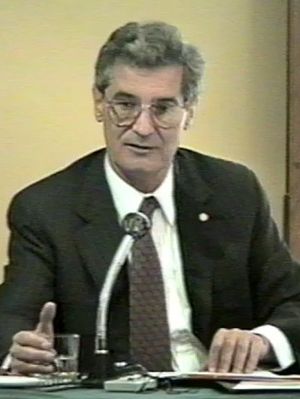Robert Lucas Jr. facts for kids
Quick facts for kids
Robert Lucas Jr.
|
|
|---|---|

Lucas in 1996
|
|
| Born |
Robert Emerson Lucas Jr.
September 15, 1937 Yakima, Washington, U.S.
|
| Died | May 15, 2023 (aged 85) Chicago, Illinois, U.S.
|
| Spouse(s) |
|
| Institution | |
| Field | Macroeconomics |
| School or tradition |
New classical macroeconomics |
| Alma mater | University of Chicago (BA, PhD) |
| Doctoral advisor |
|
| Doctoral students |
|
| Contributions |
|
| Awards | Nobel Memorial Prize in Economic Sciences (1995) |
| Information at IDEAS / RePEc | |
Robert Emerson Lucas Jr. (born September 15, 1937 – died May 15, 2023) was an important American economist. He taught at the University of Chicago. Many people see him as the main person behind a way of thinking called the new classical approach to macroeconomics.
In 1995, he won the Nobel Prize in Economics. He received this award for developing and using the idea of "rational expectations." This idea changed how economists study large-scale economic issues and helped us better understand economic policies. Another famous economist, N. Gregory Mankiw, called Lucas "the most influential macroeconomist of the last quarter of the 20th century."
Contents
Robert Lucas Jr.'s Life Story
Robert Lucas Jr. was born on September 15, 1937. His birthplace was Yakima, Washington, in the United States. He was the oldest child of Robert Emerson Lucas and Jane Templeton Lucas.
Education and Early Career
Lucas first studied History at the University of Chicago. He earned his bachelor's degree in 1959. He then started graduate school at the University of California, Berkeley. However, he left Berkeley because he needed to earn money.
In 1960, he returned to Chicago. There, he earned his PhD in Economics in 1964. His main professors for his PhD were H. Gregg Lewis and Dale Jorgenson. Lucas initially studied economics because he believed it was a key driver of history. He planned to learn economics deeply and then go back to studying history.
After finishing his studies, Lucas taught at Carnegie Mellon University. He stayed there until 1975. Then, he went back to teach at the University of Chicago.
Family Life
Robert Lucas Jr. was married twice. He had two sons, Stephen and Joseph, with his first wife, Rita Cohen. Later, he married Nancy Stokey. He and Nancy Stokey also worked together on economic papers. Their work covered topics like economic growth, government money, and how money works.
Key Ideas and Contributions to Economics
Robert Lucas Jr. made several big contributions to the field of economics. His ideas helped shape how economists think about the economy today.
What Are Rational Expectations?
Lucas is famous for looking into what happens if people have "rational expectations." This means people use all the information they have to make smart guesses about what will happen with prices and other economic things in the future. Based on these guesses, they make choices to get the most benefit over their lives.
Lucas showed how this idea fits into economic models. His work also supported the idea that in the long run, the amount of money in the economy doesn't change things like jobs or production. He also helped explain the link between how much is produced and how much prices go up, which is shown by the Phillips curve.
Understanding the Lucas Critique
Lucas also developed something called the "Lucas critique." This idea challenged how economists used to make policies. He argued that if the government changes its economic policies, the way people behave might also change. This means that old relationships, like the one between inflation and unemployment, might not hold true anymore.
For example, if a policy tries to lower unemployment by increasing inflation, people might expect this. If they expect it, they might change their behavior, making the policy less effective. This idea led to a new way of thinking in economics called new classical macroeconomics. It also pushed economists to build their big-picture (macro) models on how individual people and businesses (micro) make decisions.
Other Important Economic Ideas
Lucas also came up with other important theories:
- A theory of supply: He suggested that people might be tricked by unexpected changes in money policy.
- The Uzawa–Lucas model: This model, developed with Hirofumi Uzawa, looks at how people gain skills and knowledge (human capital).
- The Lucas paradox: This idea wonders why rich countries don't invest more money in poorer countries.
- Economic growth: His work in 1988 was very important for understanding economic development. He and Paul Romer helped start the study of "endogenous growth theory." This theory looks at how economic growth can come from inside the economy itself, not just from outside factors.
Lucas also helped explain why prices for the same thing might be different in different places. He suggested this could happen if investors don't always act perfectly rationally.
In 2003, before the "Great Recession," Lucas famously said that the problem of preventing economic depressions was "solved." He believed it had been solved for many decades.
He also proposed the Lucas Wedge. This idea tries to show how much higher a country's economic output (GDP) could be if it had the right policies.
Later Life and Passing
Robert Lucas Jr. passed away on May 15, 2023. He was 85 years old.
Images for kids
See also
 In Spanish: Robert Lucas para niños
In Spanish: Robert Lucas para niños
 | Valerie Thomas |
 | Frederick McKinley Jones |
 | George Edward Alcorn Jr. |
 | Thomas Mensah |


